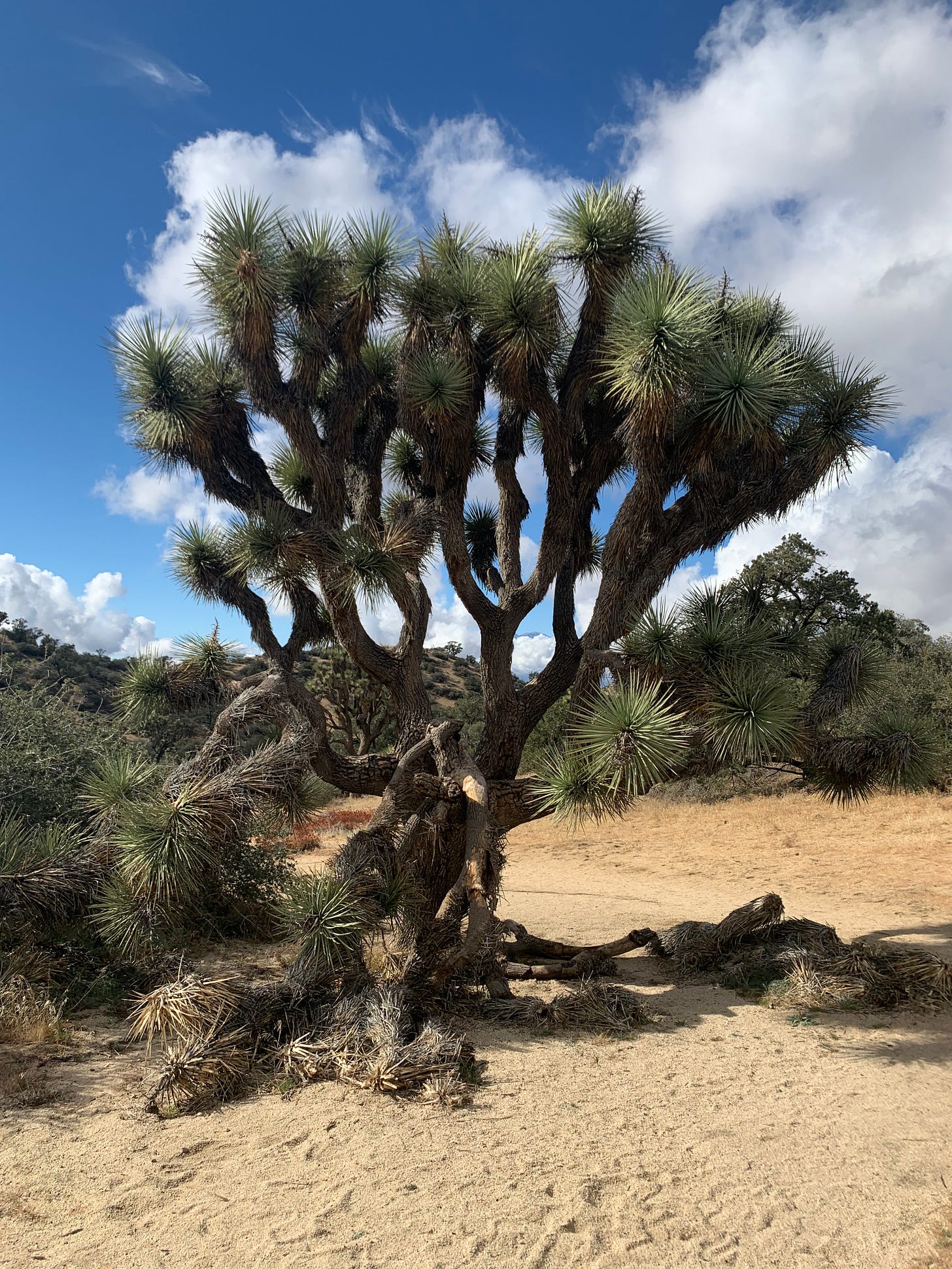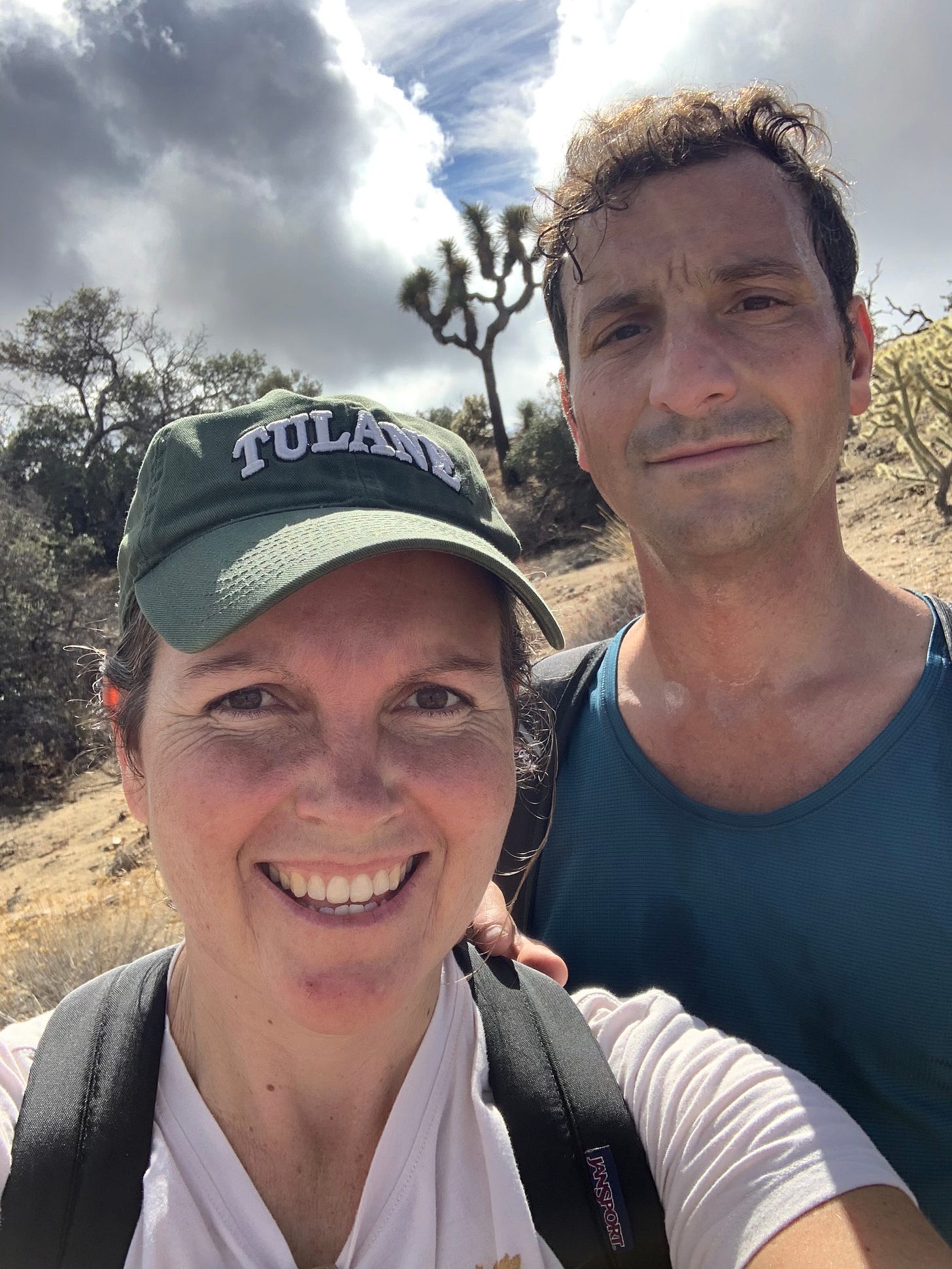Don't Judge Me by My Journals
They are a process not a product
Welcome to Pocketful of Prose, a community for sharing stories. As always, there is an audio of this post if that works better for your life. Thanks for being here. If this space feeds your soul like sugar water feeds the hummingbirds, I ask that you click the heart at the bottom and consider sharing this pocket with a friend.
Without further ado, today’s pocket
I am on a plane headed to Palm Springs, California. Dan is presenting at a conference, and I’m tagging along for the prospect of sun and warmth in mid-November. My backpack is heavy because in addition to Lynda Haupt’s Urban Bestiary, and a bar of dark chocolate, I have packed, six or seven of my used journals.
People have different reasons for keeping journals. Julia Cameron insists on morning pages, the practice of writing three pages of drivel every day to release the creativity within. I have had students who have sworn by this stream of consciousness practice. Ramona Grigg, who writes Writer Everlasting, sees journals as “the private warm-up exercise, the word salad meanderings, the lazy throwing out of thoughts that come before the good stuff starts to happen.” My Substack friend Sue Clancy who writes A.M. Sketching starts her day by doing morning sketches. Her morning pages are no drivel. They are delightful creations infused with joy and hope.
I think my journal experience is most similar to what Natalie Goldberg describes as composting. “Our bodies are garbage heaps: we collect experience, and from the decomposition of the thrown-out eggshells, spinach leaves, coffee grinds, and old steak bones of our minds come nitrogen, heat, and very fertile soil. But this does not come all at once. It takes time.” My journals are a mish mash of my life, recordings of my day, tiny details I want to remember, my gratitudes, my hopes, my frustrations, my to do lists, my story ideas…
I wonder if you have a compost pile at home. We have three, and they are in various stages of development. One is a large open heap of food scraps, decaying leaves and grass clippings. One is contained in a spinning black barrel that allows for more aeration if we do our daily duty and actually spin it. One is a plastic worm bin that a friend made for me, full of cut up cardboard and suitable food scraps, where the worms do most of the work. (Talk about a gift where I really felt seen.) The bins are different, but they are each a mess. If you want to get to the richest, most fertile soil, you have to be willing to get your hands dirty. You can only get a handful of hot hummus, if you are willing to sort through avocado pits, eggshells and withering lettuce stalks.

And this is exactly what I’m trying to do in my Alaskan Airlines middle seat. I try my best to keep my elbows to myself as I dig through the dirt and discarded pieces of my life. My memoir draft about our experience fostering Mateo is currently 64,000 words. It has the bones, but I am looking for something more, something I’m hoping to find in this hot mess of a pile, something I can work with.
When I find something, I squeal in delight, and then pull my elbows in further and apologize to my seatmates for disrupting their nap.
Here’s what I find.
I ask Seabass to help Mateo pack for camping.
Here is what they pack:
10 pairs of socks, including two sets of lime green soccer socks
one iron man suit
a cape
a dress shirt
Here is what they don’t pack:
underwear
pants
shoes
Pure gold. This is not the case with most of my other journal entries.
It’s actually awful reading through most of them. If you keep journals and have ever returned to them, you probably have an idea of what I am talking about. For every piece of gold I find, I find a lot of other stuff. Cranky, small, selfish parts of myself that I would rather not return to. Hard, sad moments I’d rather replace with thoughts of palm trees. And a fair amount of just plain boring stuff that even I don’t want to read.
You know the long skinny mirror that is designed to make you look good. Most of us have one in our house somewhere for moments when we need it. My journal is no skinny mirror. It is the hotel mirror, the one lit by fluorescent light that makes you look older and more tired than you are, the one that makes you ask, “Do I really look like this?” Going through my journals is like standing before that mirror naked. I consider myself to be body positive, but this is a lot, even for me.
I remember one time when Anna and I were discussing The Diary of Anne Frank. Anna was about fourteen at the time, and she said how awful it was that the world read Anne’s journals. What a violation.
I never thought of it like that before. Anne Frank’s journals are a peek into a private place, a place that was never intended to be shared with other people. Don’t get me wrong, I am not suggesting there isn’t a greater good that comes out of reading Anne’s journals, an empathy and understanding that comes from hearing her tell her story, but greater good arguments can be dangerous, and after hearing Anna’s take, my heart also aches for Anne, and the exposure she never intended.
On the plane, we are cruising along and close to Palm Springs. My dumpster dive into my journals is much slower. I make it three fourths of the way through one journal. I sort through the mess and type what I think has potential. I’m unable to save due to the lack of wi-fi, and at one point, I lose it all. I can’t find my document anywhere. I worry that I will have to repeat the process all over again, and I panic a little. I don’t want to spend any more time in front of the hotel mirror.
When we get to Palm Springs, Dan and I make a trip to Joshua Tree National Park. The Joshua tree was named by Mormons who thought the tree was reaching up in prayer. The story is that the branches of the tree point you in the direction you need to go. A Joshua tree can help you find your way when you are lost. When we climb up the mountain, amidst all the Joshua trees, I am mostly looking at my feet. I am dreaming of a tall cold glass of seltzer and thinking about what we might eat for dinner tonight. Step after step, I think mundane thoughts largely focused on quelling thirst, hunger, and physical ache. But when we get to the top, the panoramic view leaves me breathless. It is so quiet and still, save for a few sage sparrows, and Dan and I witness together. I breathe in and out trying to savor the moment, a trick I learned from Tara Brach, and for a moment, my mind transcends the mundane.
In that moment, it occurs to me that my journal is my Joshua tree. It’s a compass to remember where I’ve been and to find my way forward. It is a means to process and sift through my life, so I can rise to a higher plane. My journals light my way home. This week while reading an essay by Jeannine Ouellette, it occurs to me that what I write in my journals matters little, because the willingness to engage in regular writing, in a creative process, creates a “more alive version” of myself. I search through my journals looking for life in my writing, forgetting it is I that have come to life in the process of writing.
For this reason, I don’t think I can part with my journals, even though they contain the worst of me and my writing. In fact, it is because of this, that I can’t let them go. They remind me that amidst the coffee grinds, melon rinds and moldy bread, is something worth holding onto. They give me hope that over time even the messiest mess can turn into something else.
But that doesn’t mean I want anyone else to read them.
When I die, please bury my journals. Put them in a time capsule to be opened 100 years in the future, or if that feels too dramatic, cut them up into strips and feed them to the worms, word by awful word, or simply burn them. Sit by the fire and tell stories about me.
You can even toss them in the trash though I would prefer you recycle them.
Cole Arthur Riley in This Here Flesh writes that while we can see in a mirror, we can’t really see ourselves as we are. “We need other people to see our own faces—to bear witness to their beauty and truth.”
I don’t want to be remembered by my journals. I would much rather be remembered through the eyes of those that loved me.
What resonates with you today? Do you keep a journal? A sketchbook? Do you write or draw in it daily? If so, why do you keep a journal? Do you ever go back to your journals or sketches? I would love to continue this conversation in the comments.
Here’s the heart to click if this pocket resonated with you.







I loved this, Mary. It reminded me of something Sandra Cisneros said at a conference: "When I was younger, I did a lot of ranting. But ranting is uncomposted writing. No one wants to accept the coffee grounds and the banana peels, but they will pick up the flower. We have to learn to write with love, until the light shines through."
As someone with a giant box of “compost” in her basement, this post really resonates with me! I aspire to revisit these old musings in search of useful memoir material. I started rereading a few pages once. Realized I wasn’t quite ready to look in that mirror and pushed the pile of goo back under the stairs in my basement where it waits patiently. Your encouraging words spark curiosity and wonder. Can I revisit the ugliness and find some beauty in the garbage?